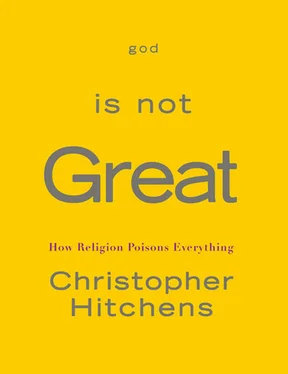This was a problem, because the drops have to be administered twice—the second time as a booster and confirmation of immunity—and because it takes only a few uninoculated people to allow the disease to survive and revive, and to spread back through contact and the water supply. As with smallpox, eradication must be utter and complete. I wondered as I left Calcutta if West Bengal would manage to meet the deadline and declare itself polio-free by the end of the next year. That would leave only pockets of Afghanistan and one or two other inaccessible regions, already devastated by religious fervor, before we could say that another ancient tyranny of illness had been decisively overthrown.
In 2005 I learned of one outcome. In northern Nigeria—a country that had previously checked in as provisionally polio-free—a group of Islamic religious figures issued a ruling, or fatwa, that declared the polio vaccine to be a conspiracy by the United States (and, amazingly, the United Nations) against the Muslim faith. The drops were designed, said these mullahs, to sterilize the true believers. Their intention and effect was genocidal. Nobody was to swallow them, or administer them to infants. Within months, polio was back, and not just in northern Nigeria. Nigerian travelers and pilgrims had already taken it as far as Mecca, and spread it back to several other polio-free countries, including three African ones and also faraway Yemen. The entire boulder would have to be rolled back right up to the top of the mountain.
You may say that this is an “isolated” case, which would be a grimly apt way of putting it. But you would be mistaken. Would you care to see my video of the advice given by Cardinal Alfonso Lopez de Trujillo, the vatican’s president of the Pontifical Council for the Family, carefully warning his audience that all condoms are secretly made with many microscopic holes, through which the AIDS virus can pass? Close your eyes and try to picture what you might say if you had the authority to inflict the greatest possible suffering in the least number of words. Consider the damage that such a dogma has caused: presumably those holes permit the passage of other things too, which rather destroys the point of a condom in the first place. To make such a statement in Rome is wicked enough. But translate the message into the language of poor and stricken countries and see what happens. During carnival season in Brazil, the auxiliary bishop of Rio de Janeiro, Rafael Llano Cifuentes, told his congregation in a sermon that “the church is against condom use. Sexual relations between a man and a woman have to be natural. I have never seen a little dog using a condom during sexual intercourse with another dog.” Senior clerical figures in several other countries—Cardinal Obando y Bravo of Nicaragua, the archbishop of Nairobi in Kenya, Cardinal Emmanuel Wamala of Uganda—have all told their flocks that condoms transmit AIDS. Cardinal Wamala, indeed, has opined that women who die of AIDS rather than employ latex protection should be considered as martyrs (though presumably this martyrdom must take place within the confines of marriage).
The Islamic authorities have been no better and sometimes worse. In 1995, the Council of Ulemas in Indonesia urged that condoms only be made available to married couples, and on prescription. In Iran, a worker found to be HIV-positive can lose his job, and doctors and hospitals have the right to refuse treatment to AIDS patients. An official of Pakistan’s AIDS Control Program told Foreign Policy magazine in 2005 that the problem was smaller in his country because of “better social and Islamic values.” This, in a state where the law allows a woman to be sentenced to be gang-raped in order to expiate the “shame” of a crime committed by her brother. This is the old religious combination of repression and denial: a plague like AIDS is assumed to be unmentionable because the teachings of the Koran are enough in themselves to inhibit premarital intercourse, drug use, adultery, and prostitution. Even a very brief visit to, say, Iran, will demonstrate the opposite. It is the mullahs themselves who profit from hypocrisy by licensing “temporary marriages,” in which wedding certificates are available for a few hours, sometimes in specially designated houses, with a divorce declaration ready to hand at the conclusion of business. You could almost call it prostitution… The last time I was offered such a bargain it was just outside the ugly shrine to the Ayatollah Khomeini in south Tehran. But veiled and burqa-clad women, infected by their husbands with the virus, are expected to die in silence. It is a certainty that millions of other harmless and decent people will die, very miserably and quite needlessly, all over the world as a result of this obscurantism.
The attitude of religion to medicine, like the attitude of religion to science, is always necessarily problematic and very often necessarily hostile. A modern believer can say and even believe that his faith is quite compatible with science and medicine, but the awkward fact will always be that both things have a tendency to break religion’s monopoly, and have often been fiercely resisted for that reason. What happens to the faith healer and the shaman when any poor citizen can see the full effect of drugs and surgeries, administered without ceremonies or mystifications? Roughly the same thing as happens to the rainmaker when the climatologist turns up, or to the diviner from the heavens when schoolteachers get hold of elementary telescopes. Plagues of antiquity were held to be punishment from the gods, which did much to strengthen the hold of the priesthood and much to encourage the burning of infidels and heretics who were thought—in an alternative explanation—to be spreading disease by witchcraft or else poisoning the wells.
We may make allowances for the orgies of stupidity and cruelty that were indulged in before humanity had a clear concept of the germ theory of disease. Most of the “miracles” of the New Testament have to do with healing, which was of such great importance in a time when even minor illness was often the end. (Saint Augustine himself said that he would not have believed in Christianity if it were not for the miracles.) Scientific critics of religion such as Daniel Dennett have been generous enough to point out that apparently useless healing rituals may even have helped people get better, in that we know how important morale can be in aiding the body to fight injury and infection. But that would be an excuse only available in retrospect. By the time Dr. Jenner had discovered that a cowpox vaccine could ward off smallpox, this excuse had become void. Yet Timothy Dwight, a president of Yale University and to this day one of America’s most respected “divines,” was opposed to the smallpox vaccination because he regarded it as an interference with god’s design. And this mentality is still heavily present, long after its pretext and justification in human ignorance has vanished.
It is interesting, and suggestive, that the archbishop of Rio makes his analogy with dogs. They do not trouble to roll on a condom: who are we to quarrel with their fidelity to “nature”? In the recent division in the Anglican Church over homosexuality and ordination, several bishops made the fatuous point that homosexuality is “unnatural” because it does not occur in other species. Leave aside the fundamental absurdity of this observation: are humans part of “nature” or not? Or, if they chance to be homosexual, are they created in god’s image or not? Leave aside the well-attested fact that numberless kinds of birds and mammals and primates do engage in homosexual play. Who are the clerics to interpret nature? They have shown themselves quite unable to do so. A condom is, quite simply, a necessary but not a sufficient condition for avoiding the transmission of AIDS. All qualified authorities, including those who state that abstinence is even better, are agreed on this. Homosexuality is present in all societies, and its incidence would appear to be part of human “design.” We must perforce confront these facts as we find them. We now know that the bubonic plague was spread not by sin or moral backsliding but by rats and fleas. Archbishop Lancelot Andrewes, during the celebrated “Black Death” in London in 1665, noticed uneasily that the horror fell upon those who prayed and kept the faith as well as upon those who did not. He came perilously close to stumbling upon a real point. As I was writing this chapter, an argument broke out in my hometown of Washington, D.C. The human papillomavirus (HPV) has long been known as a sexually transmitted infection that, at its worst, can cause cervical cancer in women. A vaccine is now available—these days, vaccines are increasingly swiftly developed—not to cure this malady but to immunize women against it. But there are forces in the administration who oppose the adoption of this measure on the grounds that it fails to discourage premarital sex. To accept the spread of cervical cancer in the name of god is no different, morally or intellectually, from sacrificing these women on a stone altar and thanking the deity for giving us the sexual impulse and then condemning it.
Читать дальше












